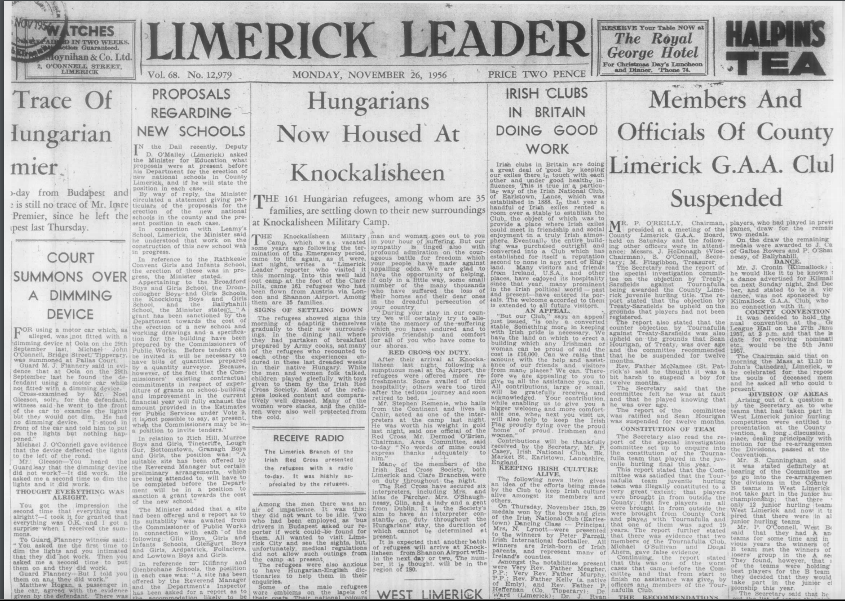An old army barracks. A disused hotel. A former convent school for girls.
This motley collection of buildings, each constructed with very different purposes and each with stories from their various pasts, have now diverged into a connected present. They have been repurposed from their former lives, transformed into a new function. They are now Limerick’s Direct Provision centres, scattered across the county from Foynes to the city centre to Knockalisheen.
I visited all three centres on one very hot day last week. My sunburnt arm from hanging it out the car window is testament to my Limerick odyssey-of-sorts. The mission was to put notices up in each of the three centres, inviting residents in Direct Provision to an open dress rehearsal of the Abbey Theatre’s production of Jimmy’s Hall, which opened in the Lime Tree Theatre earlier this week. It is the story of Jimmy Gralton, the socialist who built a little dancehall in a field in Leitrim and refused to hand control of it over to the Church. For this he was subsequently deported by DeValera’s government as an “undesirable alien”, despite being born in Effrinagh, County Leitrim in 1886. It is a story with the struggle for justice, freedom and equality at its core, and a community’s fight against an unjust deportation. Not a million miles away from the stories and experiences of many currently living under threat of deportation in Direct Provision right now.
Knockalisheen DP Centre is situated on a hill with a view of Limerick City when the sun shines. A labyrinth of portakabins and low-rise buildings, it houses around 230 people who have come to Ireland seeking asylum, including about 70 children. It is the only centre in Limerick with family accommodation, as two small play areas in the grounds indicate, yet when I arrive these lie empty. I go to the reception to stick up the notice about the play on the board, beside signs for English classes and how to seek legal advice on your application.
This centre used to be an army barracks, but its new reincarnation is not unfamiliar to it. In 1956, more than 500 Hungarian refugees were housed here. They were given a great welcome by the citizens of Limerick, but this welcome did not last on an administrative level. Despite the UN Convention conferring on all refugees the right to work, considerable efforts were made to prevent the Hungarians from seeking employment. One article from the Limerick Leader dated November 26th 1956 quoted some of the Hungarian men as saying that “they did not want to be idle”. This is scarily still the case in Direct Provision now, with the new regulations around the Right to Work still inaccessible to the majority of asylum seekers.
The Hungarians were confined to the Knockalisheen camp, and a Department of Defence report at the time likened it to an internment camp. In April 1957, most of the adults went on hunger strike as a stand against the conditions they were forced to live in.
Fast forward to 2007, when 200 asylum seekers in the same Knockalisheen camp went on hunger strike in protest against the diet and the poor quality of accommodation in the centre. History has a scary way of repeating itself. As I left the reception area having been relieved of most of the flyers by some enthusiastic young girls, I noticed the sign they have up on the wall – “Enjoy each day, and don’t forget to smile”. It takes on an eerie aggression in a place where people are sent to wait for months, often years, while their asylum application is processed.
Heading back in to town I make for Glentworth Street DP Centre, in the middle of the city. The plaster on the walls outside is crumbling, and the hinges where a sign once swung in the breeze can still be seen. This was the historic Hanratty’s Hotel, a busy spot in the epi-centre of Limerick life. DeValera used to stay there when he was canvassing in Limerick and Clare. In the 1980s, touring theatre companies to Belltable used to opt for the surroundings of Hanratty’s after performing. I’d say many a seisiún was had there after shows. But it has changed a lot since those days. The little door to get in to the centre is around the side and there is no natural light. I’m dazzled for a bit after coming in from the sun outside, but stick the notice up on the board. There are mostly single men in this centre, and some of them ask me about the play. The manager watches me from through the reception desk Perspex glass as I leave.
Back on the road heading to Foynes for the final stop, my arm considerably pinker than when I left this morning. Mount Trenchard houses 55 single men, an old grand house that was later bought by the Sisters of Mercy and turned in to a private boarding school for girls. The original house was built by the Anglo-Irish Rice family, and it has a dramatic past. It was used as a safehouse by IRA fighters during the War of Independence. The family boat was used to ferry men and arms across the Shannon Estuary. Mary Spring Rice who was reared on the Mount Trenchard estate was actively involved in gunrunning in the fight for Irish freedom in 1913 and 1914, held many nationalist meetings in the house and set up a branch of Cumann na mBan in Foynes. The Sisters of Mercy later built on to the original house, and what was the old chapel is now the recreation room for the residents in Direct Provision, a few pool tables lit up by the sunlight coming through the stained glass windows.
I had no idea how many people would turn up for the open dress rehearsal of Jimmy’s Hall. Western Limerick Resources and Doras Luimní very kindly sorted transport from the two isolated centres, as otherwise it would be impossible for people to get to the Lime Tree Theatre. But at 2pm on Saturday, people started arriving. About 40 in all, from all around the world and of all ages.

I sat beside one eight-year-old fella as the director Graham McLaren introduced the play and said it was an honour to have so many people currently living in DP as the first audience for the new version of Jimmy’s Hall. The band struck up and got a rapturous applause after each of the preshow tunes, especially the rendition of Whitney Houston’s I Wanna Dance With Somebody. The little fella beside me sat on the edge of his seat the entire show, glued to the stage. It was an electric, exhilarating performance, and though I had seen the show a few times before it took on new meaning seeing it in that audience. The lines about deportation and injustice especially took on a weighted significance. The resistance dance at the end was explosive, and got a great applause from everyone. It was one of those rare times where you see anew what theatre can do. One guy afterwards told me he had never seen theatre before, and was blown away by it. The power of theatre is that it can challenge, demand attention and bring us to places we didn’t think possible. It is entertaining yes, but that intangible something that comes from watching exciting, enlightening theatre is what really gets me. The resistance dance played on loop in my head as I waved at the buses heading back to Mount Trenchard in Foynes and Knockalisheen. And it stayed with me all the way in the car back to Dublin. What happened to Jimmy Gralton must not happen to anyone else seeking refuge in our country. We must all dance the resistance dance and demand an end to Direct Provision. It is time.
The next performance in the development of Displace by Belltable Artist in Residence Katie O’Kelly will take place in Belltable in December 2018. We will continue to keep you updated on the piece’s progress through Belltable:Connect blogs.













